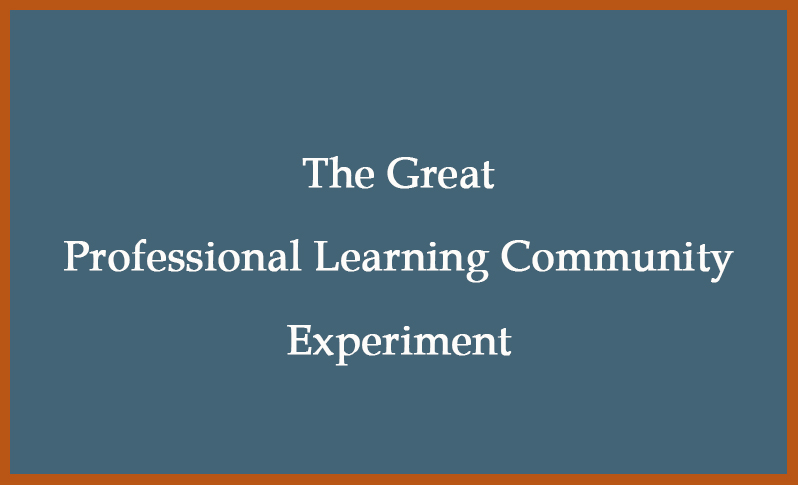Everything can be innovated—case in point, the Professional Learning Community (PLC).
While we have been using PLCs on campus for the past decade (for more thorough information go to http://tlc.eku.edu/professional-learning-communities), we have always tried to innovate their use. Ten years ago Milton Cox, the godfather of PLCs, came to our campus to put on a workshop that introduced us to the traditional structure of PLCs, something we have written about in the past. What we saw, however, was not a fixed structure (e.g., 8-12 faculty study a subject for an entire semester and develop some enduring product), but an entity that we could repurpose for our various uses.
One semester, for instance, we emphasized large numbers, running approximately twenty PLCs in just the College of Education for everything from curriculum reform to transferring ownership of a state-run journal. In 2009 when the state decreed through Senate Bill 1 that we had to provide a seamless transition of common core standards from K-12 through postsecondary education, we created something we called the embedded PLC wherein we facilitated a core PLC of ten members and then each one of the members facilitated a PLC in his/her respective areas (e.g., math English, natural sciences, teacher preparation).
Launching The Great PLC Experiment
This semester we tried another tweak—what we called the Great PLC Experiment. For the past decade every PLC we have run has had a minimal lifespan of an entire semester. Some PLCs are so popular that members, not wanting to see a good thing end, decide to continue through the next semester (e.g., flipping the classroom, metacognition, and cultural competency). We have seen the same continuation phenomenon in our Breakfast & a Book Series as our Sheryl Sandberg Lean In group continued for three consecutive semesters.
Like a lot of innovation, the PLC experiment derived from a problem. Last summer Tim, our cultural competency facilitator and Faculty Innovator, came to us with a dilemma. He wanted to continue all the work he had been doing with us, but as he also served as coordinator of the campus African African-American Studies program, he had responsibilities, especially in observation of his program’s instructors, that needed to take place starting in mid-October.
Since every problem begs for a solution, we met with Tim and decided to try something new, what we now call the compressed PLC. Basically, since by our definition a PLC must meet a minimum of eight times, we decided that the cultural competency PLC would hold meetings in each of the first eight weeks of the semester—our version of the new favorite in academic circles, the eight-week course. Having never tried this form of PLC, we knew a lot of risk was involved. Usually, an every-other-week meeting is preferred so that faculty don’t feel overloaded by the add-on that is the PLC. Giving them more time helps ensure that members come to PLC meetings prepared.
The PLC Experiment Results
Well, the semester is now over, and the PLC evaluations are in. While we feared members might complain about not having sufficient time to prepare excellent presentations, they revealed the opposite. Compression meant deeper engagement in the subject. Weekly meetings also reaped another benefit that put the “C” back in PLCs—deeper friendships. Meeting more often seemed to foster a greater sense of togetherness and shared purpose.
Yes, we found a downside. Every PLC needs a product, and in this case we were developing a video repository as well as a book on cultural competency for New Forums Press. Eight weeks of study and presentations, however, left little time to develop the products.
Takeaways from The PLC Experiment
What’s the solution? Continue the PLC for another semester as we have in the past? Unfortunately, that solution puts a lot of pressure on the already overloaded facilitator. We have decided simply to work outside the PLC. Members can get help from Tim or the three of us on their writing and video development.
Had we not also been developing a minor in Applied Creative Thinking (ACT) and writing two books for New Forums—Introduction to Applied Creative Thinking and Teaching Applied Creative Thinking–while implementing a PLC program for campus, we might not have been so innovative. Certainly, our work with ACT led us to look at our successful programs from new perspectives and be open to taking risks where new opportunities presented themselves.
After all, innovation is a frame of mind that can be applied to any number of projects.
Author
 Charlie Sweet is currently Co-Director of the Teaching & Learning Center (2007+) at Eastern Kentucky University. Before going over to the dark side of administration, for 37 years he taught American Lit and Creative Writing in EKU’s Department of English & Theatre, where he also served as chair (2003-2006). Collabo-writing with Hal Blythe, he has published well over 1000 items, including 15 books; of his 11 books with New Forums. Meet Charlie.
Charlie Sweet is currently Co-Director of the Teaching & Learning Center (2007+) at Eastern Kentucky University. Before going over to the dark side of administration, for 37 years he taught American Lit and Creative Writing in EKU’s Department of English & Theatre, where he also served as chair (2003-2006). Collabo-writing with Hal Blythe, he has published well over 1000 items, including 15 books; of his 11 books with New Forums. Meet Charlie.



